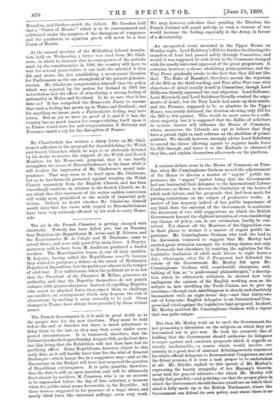A carious debate arose in the House of Commons on
Tues- day, when Mr. Cunninghame Graham moved the adjournment of the House to discuss a matter of " urgent " public im- portance, the " urgent " matter being that the Government had not instructed their delegates to the International Labour Conference at Berne to discuss the limitation of the hours of adult male labour, and the proposals that had been made for putting restrictions on the output of productive works. A matter of less urgency, indeed of less public importance of any kind, than the omission of the Government to authorise the discussion of two wild suggestions on which the British Government has not the slightest intention of even considering any change of policy, can, in our estimation, hardly be con- ceived. Yet almost all the Members of the Opposition rose in their places to declare it a matter of urgent public im- portance. Mr. Cunninghame Graham, who took the lead in the discussion, ventured to suggest that Mr. Morley had excited great irritation amongst the working classes, not only in Newcastle but elsewhere, by resisting the .agitation for the legislative limitation of adult male labour to eight hours a day ; whereupon, after Sir J. Fergusson had defended the course of the Government, Mr. Morley fell upon Mr. Cunninghame Graham with considerable sharpness, and, talking of him as "a professional philanthropist," a descrip- tion which he afterwards withdrew, he showed how very ambiguous the opinion of the English working men on the subject is, how unwilling the Trade-Unions are to give up. overtime,—though such unwillingness is clearly and absolutely inconsistent with an eight hours' day,—and that thirty-two out of forty-nine English delegates to an International -Con- gress had voted against the legislative limit proposed. In short, Mr. Morley snubbed Mr. Cunninghame Graham with a vigour that was quite unique.


































 Previous page
Previous page